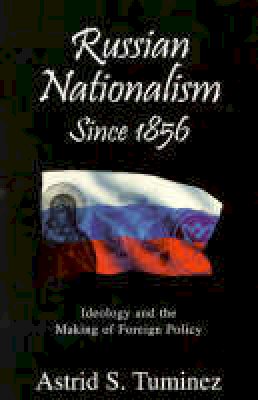
Stock image for illustration purposes only - book cover, edition or condition may vary.
Russian Nationalism since 1856: Ideology and the Making of Foreign Policy
Astrid S. Tuminez
€ 73.99
FREE Delivery in Ireland
Description for Russian Nationalism since 1856: Ideology and the Making of Foreign Policy
Paperback. This text describes the range of nationalist ideas that have taken root in Russia since 1856. Drawing on a wide range of archival documents and interview material from the post-Soviet period, it analyzes two cases - Russian panslavism in 1856-1878 and great power nationalism in 1905-1914. Num Pages: 352 pages. BIC Classification: 1DVUA; 3JH; 3JJ; JPFN; JPS. Category: (P) Professional & Vocational; (UP) Postgraduate, Research & Scholarly; (UU) Undergraduate. Dimension: 229 x 147 x 19. Weight in Grams: 460.
This thoughtful book describes the range of nationalist ideas that have taken root in Russia since 1856. Drawing on a wide range of archival documents and unparalleled interview material from the post-Soviet period, Tuminez analyzes two cases_Russian panslavism in 1856-1878 and great power nationalism in 1905-1914_when aggressive nationalist ideas clearly influenced Russian foreign policy and contributed to decisions to go to war. Yet not all forms of nationalism have been malevolent, and the author assesses competing nationalist ideologies in the post-Soviet period to clarify the conditions under which a particularly belligerent nationalism could flourish and influence Russian international behavior.
This thoughtful book describes the range of nationalist ideas that have taken root in Russia since 1856. Drawing on a wide range of archival documents and unparalleled interview material from the post-Soviet period, Tuminez analyzes two cases_Russian panslavism in 1856-1878 and great power nationalism in 1905-1914_when aggressive nationalist ideas clearly influenced Russian foreign policy and contributed to decisions to go to war. Yet not all forms of nationalism have been malevolent, and the author assesses competing nationalist ideologies in the post-Soviet period to clarify the conditions under which a particularly belligerent nationalism could flourish and influence Russian international behavior.
Product Details
Publisher
Rowman & Littlefield Publishers
Format
Paperback
Publication date
2000
Condition
New
Weight
460 g
Number of Pages
352
Place of Publication
Lanham, MD, United States
ISBN
9780847688845
SKU
V9780847688845
Shipping Time
Usually ships in 15 to 20 working days
Ref
99-15
About Astrid S. Tuminez
Astrid S. Tuminez is senior research associate with the U.S. Institute of Peace.
Reviews for Russian Nationalism since 1856: Ideology and the Making of Foreign Policy
Tuminez's study of Russian mationalism explores important links between nationalism and foreign policy. Recommended.
CHOICE
This brilliant book illuminates one of the crucial problems of the twenty-first century. No subject arouses stronger emotions, for better and worse, than nationalism. No country's nationalism is more important for humanity's future than Russia's. Dr. Tuminez clarifies the various formulations of Russian nationalism in historical perpective and shows their implications for foreign policy. These insights have worldwide significance.
David A. Hamburg M.D., president emeritus, Carnegie Corporation of New York This book argues, in part, that Russia's evolution as a state has been guided for centuries by the imperatives of a sprawling empire. As a consequence, the idea of the people or 'nation' as the arbiter of political authority did not take root. In the past decade, Russians have dismantled the old empire, embarked on democratic reforms, and begun shaping a new state. The future of this new Russia remains unknown, but competing variants of Russian nationalism today are key to shaping that future. Policymakers will gain both historical and practical insights from this well-written and thoughtful work.
Sam Nunn The nature of Russian nationalism fascinates, but its make-up is unsufficiently understood. This outstanding book illuminates an area of profound international importance which will help shape the twenty-first century.
The Rt. Hon. the Lord Owen CH, House of Lords, UK Perceptive and thoughtful. . . . A fair-minded and astute guide to the complex relationship between Russia's internal politics and its foreign policy.
Geoffrey Hosking
Slavic Review
A well-researched and well-written book that tells an interesting and important story. . . . It will also serve undergraduates as an outstanding survey of the history of Russian nationalism.
H-Net: Humanities and Social Science Reviews Online
CHOICE
This brilliant book illuminates one of the crucial problems of the twenty-first century. No subject arouses stronger emotions, for better and worse, than nationalism. No country's nationalism is more important for humanity's future than Russia's. Dr. Tuminez clarifies the various formulations of Russian nationalism in historical perpective and shows their implications for foreign policy. These insights have worldwide significance.
David A. Hamburg M.D., president emeritus, Carnegie Corporation of New York This book argues, in part, that Russia's evolution as a state has been guided for centuries by the imperatives of a sprawling empire. As a consequence, the idea of the people or 'nation' as the arbiter of political authority did not take root. In the past decade, Russians have dismantled the old empire, embarked on democratic reforms, and begun shaping a new state. The future of this new Russia remains unknown, but competing variants of Russian nationalism today are key to shaping that future. Policymakers will gain both historical and practical insights from this well-written and thoughtful work.
Sam Nunn The nature of Russian nationalism fascinates, but its make-up is unsufficiently understood. This outstanding book illuminates an area of profound international importance which will help shape the twenty-first century.
The Rt. Hon. the Lord Owen CH, House of Lords, UK Perceptive and thoughtful. . . . A fair-minded and astute guide to the complex relationship between Russia's internal politics and its foreign policy.
Geoffrey Hosking
Slavic Review
A well-researched and well-written book that tells an interesting and important story. . . . It will also serve undergraduates as an outstanding survey of the history of Russian nationalism.
H-Net: Humanities and Social Science Reviews Online
